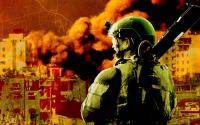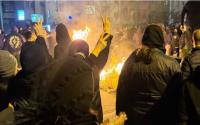21 March 2005Danny Schechter
At the end of this week's edition of ABC's This Week, in a discussion that felt like the discussion the week before and the week before that, it was noted that the Hill seems strangely silent in protesting the war.
In fact, as an Inter Press Service report noted, "No leading politician from the opposition Democratic Party participated in the anti-war protests, nor made any speeches at the rallies The event was organized by a nationwide coalition representing an array of grassroots community peace and social justice groups."
Not surprisingly, the absence of members of the political elite in the streets was mirrored by the paucity of coverage in the elite press which is not particularly partial to covering grass roots activism. The NY Times focused on one small civil disobedience protest at military recruiting office in Times Square, just down the street from the Times office, A protest at the Times itself may have made real news.
There were more Antiwar actions in more cities than ever but that proliferation of protest or the presence of military families seemed to not too newsworthy. A media that routinely plays down the size of all protests in this case seemed to be obsessed with nothing more than their size, as in the protests were "smaller than ever." What were they saying?
While the US press is still showcasing Administration claims that democracy is on the march in Iraq, international news agencies reported that many of Iraq's voters turned out to oppose the US occupation, not embrace it as the White House implies. (See Iraq expert, Professor Juan Cole's refutation on this point at JuanCole.com)
While the NY Times reports on a Marine General's claim that the insurgency is sputtering out, no insurgents are interviewed nor are their claims reported. Its totally one-sided. Yes, there are websites carrying reports from their side claiming far more attacks than are reported here.
While the Pentagon still gets the first word in the US, media, Arab media covers what US independent journalists are reporting.
Example. Al Jazeera reported on Saturday:
"All is quiet in Falluja, or at least that is how it seems, given that the mainstream media has largely forgotten about the Iraqi city. But independent journalists are risking life and limb to bring out a very different story.
"The picture they are painting is of US soldiers killing whole families, including children, attacks on hospitals and doctors, the use of napalm-like weapons and sections of the city destroyed.
"One of the few reporters who has reached Falluja is American Dahr Jamail of the Inter Press Service. He interviewed a doctor who had filmed the testimony of a 16-year-old girl.
"She stayed for three days with the bodies of her family who were killed in their home. When the soldiers entered she was in her home with her father, mother, 12 year-old brother and two sisters.
"She watched the soldiers enter and shoot her mother and father directly, without saying anything. They beat her two sisters, then shot them in the head. After this her brother was enraged and ran at the soldiers while shouting at them, so they shot him dead," Jamail relates."
I recently met and was impressed with Jamail's bravery as he recounted this and other stories at the World Tribunal on Iraq in Rome. He recently wrote, advising that CNN's Aaron Brown Show invited him on. I urged him to do it. He then advised that they never got back to him
Even as voices such as Jamail's are marginalized in the mainstream media and war criticism is downplayed, a mainstream media monitoring organization felt compelled to do a study to prove there isn't an ANTI-WAR bias in the media.
Editor & Publisher reported: "And it determined that Fox News Channel was the most one-sided of all major news outlets. In fact, the idea that Americans are engaged in "partisan" news consumption isn't supported by the research. With the exception of Republicans who prefer Fox News, most media use mirrors the general population, the study found.
The Washington-based project examined more than 2,000 stories on the war in Iraq and found that 25% of the stories were negative and 20% were positive. "The majority of stories were just news," said the project's director, Tom Rosenstiel.
"The Project for Excellence in Journalism is affiliated with the Columbia University School of Journalism. The study was funded by the Pew Charitable Trusts."
"Just News?"
And just what is that? Reporting that tilts towards Administration framing; news that excludes information about civilian casualties. News that avoids allegations of war crimes. News that never speaks with insurgents or explains their outlook.
"Just News" is as often another form of propaganda dressed up in the garb of objectivity.
Recently, Madison Wisconsin's Capitol Times opined, "if we had a better press, we'd have a better president.'
It might be just as accurate to say that if we had a better press we might not have had this war at all. What puzzles me: why doesn't the antiwar movement get that point and decide, at long last, to do something about it.
Then we might have JUST news, not just news or just us news. JUST news in the spirit of justice, not just recycled conventional wisdom,
News Dissector Danny Schechter is blogger in chief at Mediachannel.org. His film on the media coverage of the war WMD (Weapons of Mass Deception) is just out on DVD. See www.wmdthefilm.com






